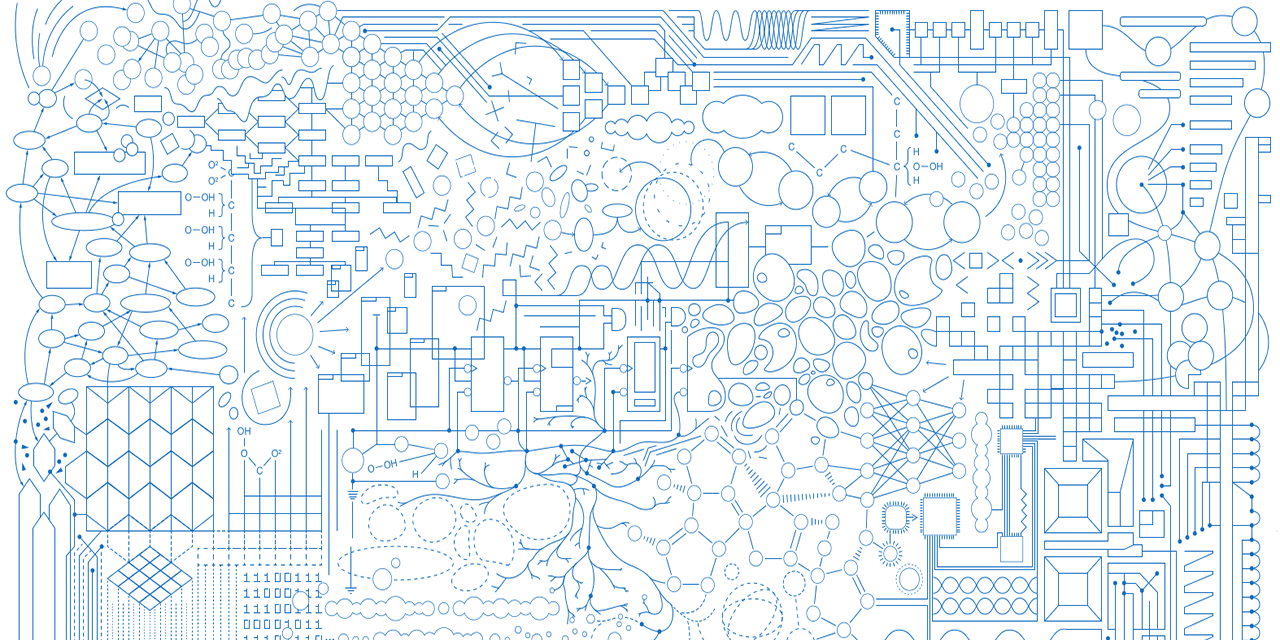Get to know our fellows: Hadeel Naeem
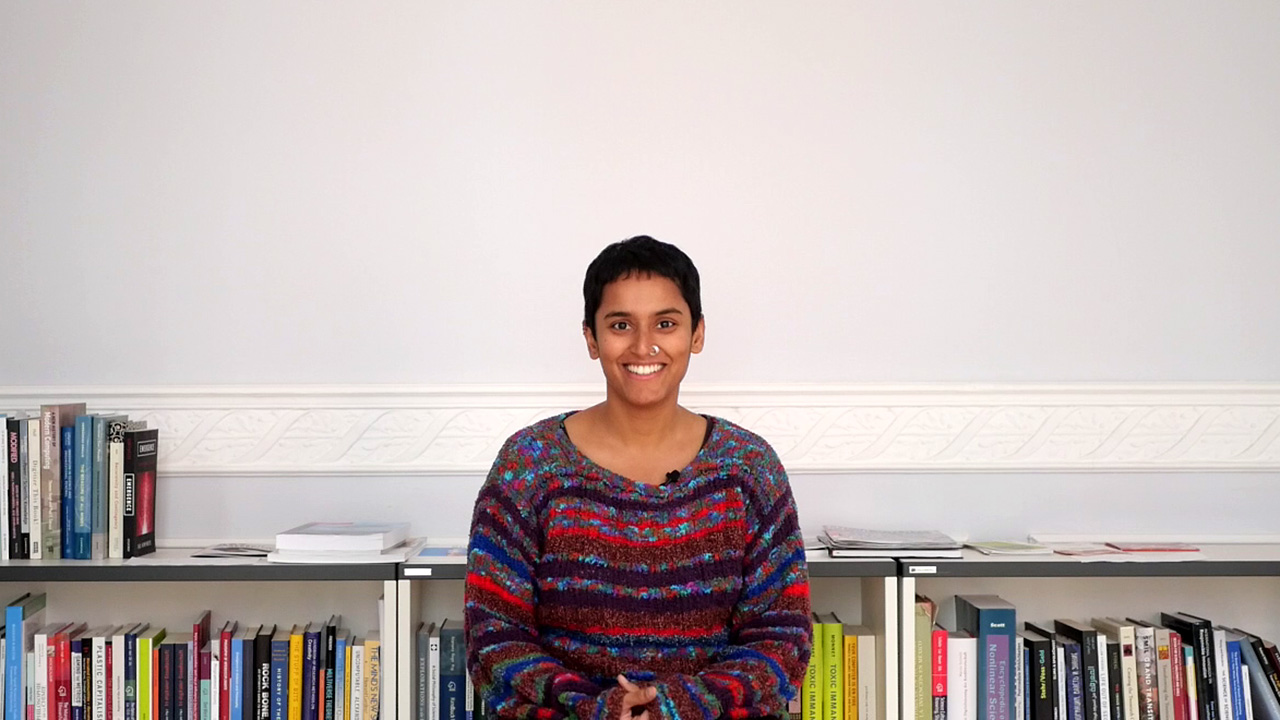
Get to know our current fellows and gain an impression of their research.
In a new series of short videos, we asked them to introduce themselves, talk about their work at c:o/re, the impact of their research on society and give book recommendations.
You can now watch the third video of the philosopher Hadeel Naeem on our Youtube channel:
Objects of Research: Hadeel Naeem
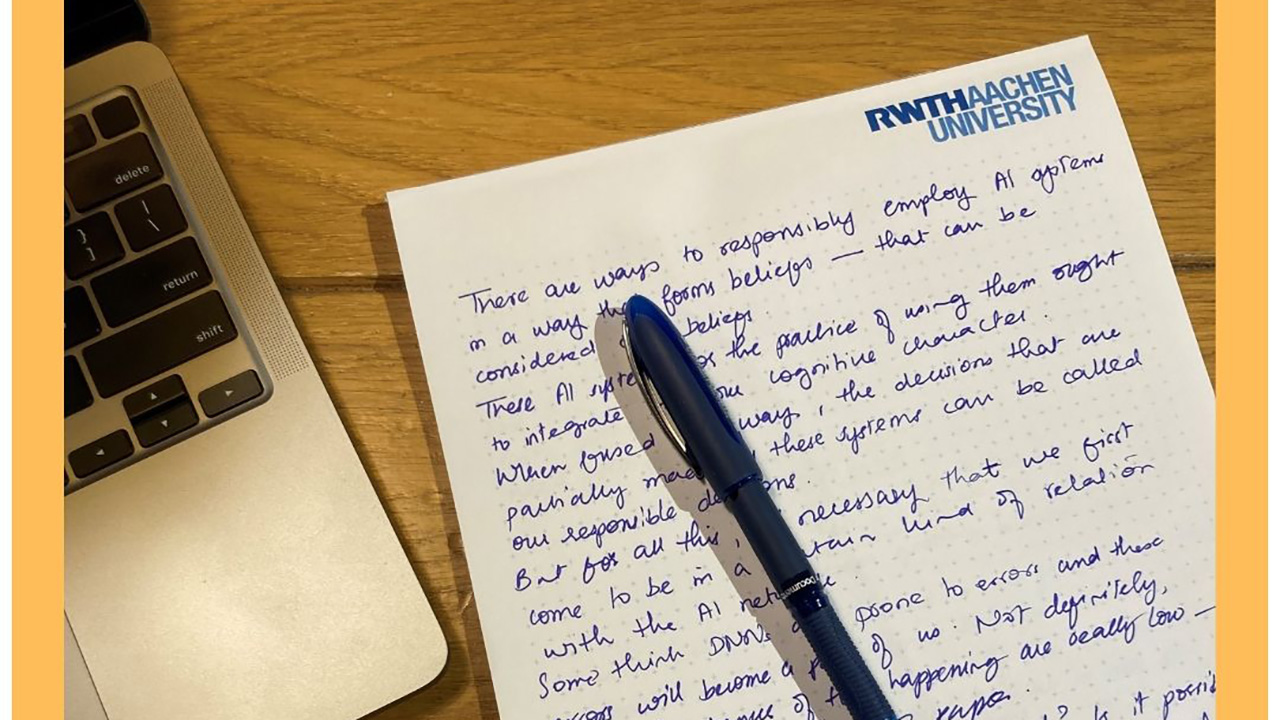
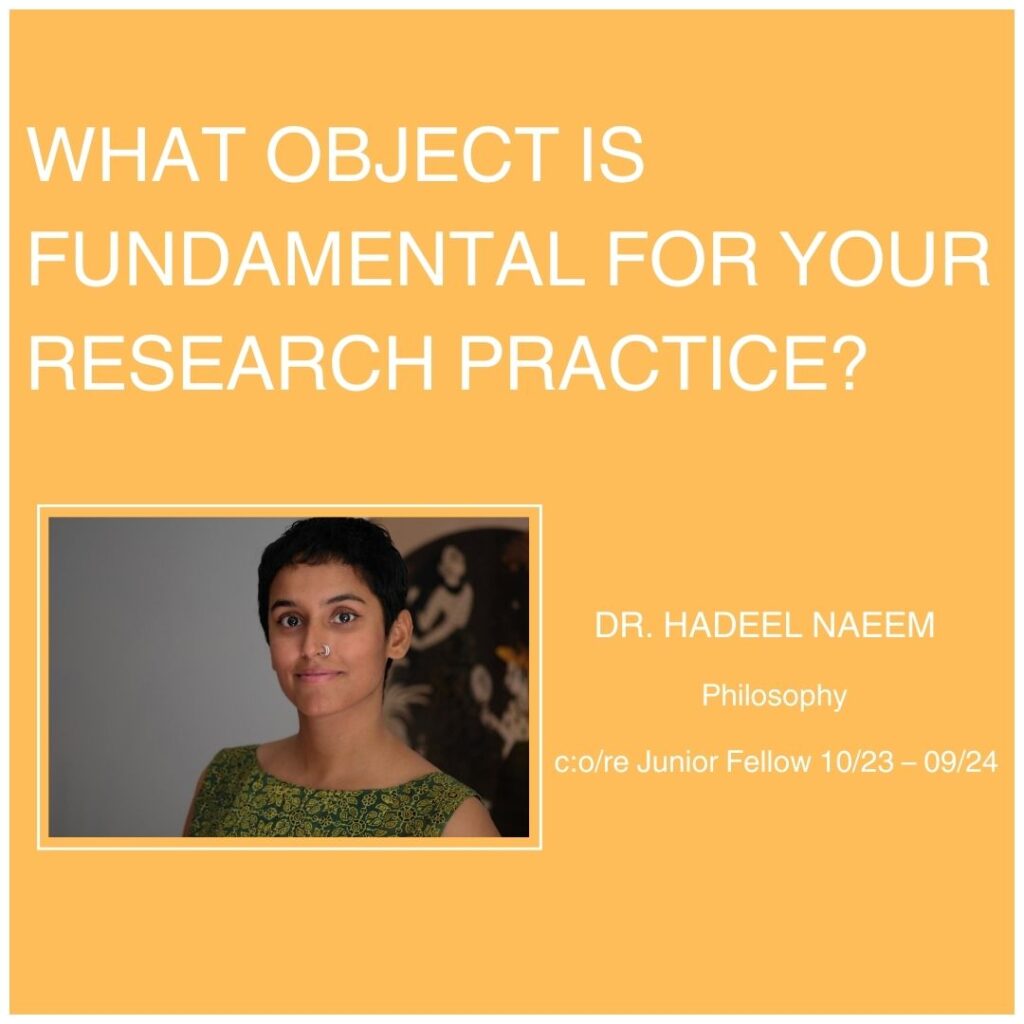
For today’s edition of our “Objects of Research” series, we interviewed c:o/re Junior Fellow Hadeel Naeem. Her current research focuses on how to responsibly extend the mind with AI systems and therefore acquire extended knowledge.
“A pen and a notebook are essential for my research. They help me think. It’s not at all about the words I write. I rarely read them again. Scribbling is just an act that helps me stack ideas on top of each other and do all the complicated thinking and connection-building.
I also turn to scribbling in my notebook when I am stuck in the writing process. There is often a time after the first rough draft of the paper when some ideas stop flowing smoothly or don’t fit very well with the main argument. I turn to the notebook and start writing the main ideas, deliberating how they support each other.
This is all especially interesting since a lot of my research is about extended cognition, which is the idea that we sometimes employ external resources such that part of our thinking happens outside our body (in these resources).”

Call for Abstracts: Workshop on “Participation and STS sensibilities: taking stock and moving forward”
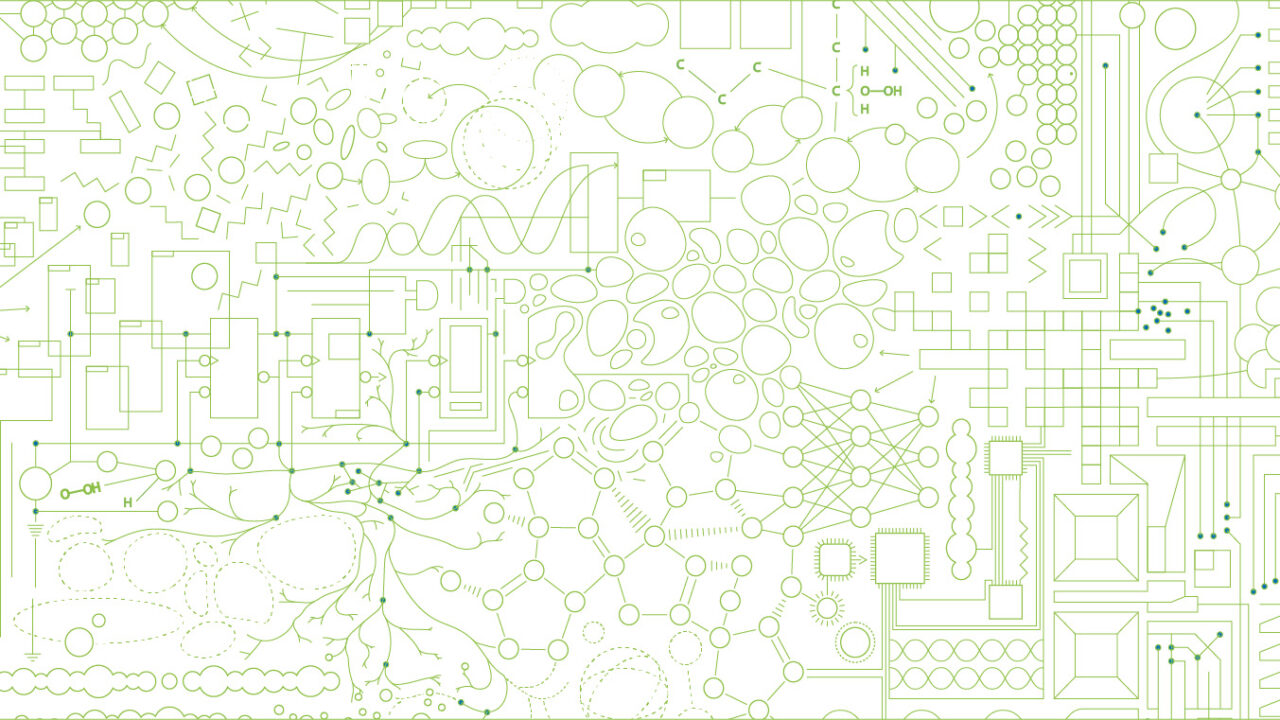
Interested scholars are invited to submit abstracts for the workshop “Participation and STS sensibilities: taking stock and moving forward”. This workshop aims to explore what taking STS sensibilities seriously would mean for conceiving, understanding, practicing, and valuing public participation.
Keynote speaker: Professor Jason Chilvers (University of East Anglia)
Date: 23 May 2024
Location: Maastricht, The Netherlands
Abstract submission: abstracts (500 words) can be submitted here by 15 January 2024.
The workshop is organized by Care and Public Health Institute (Maastricht University, The Netherlands) with support of The Käte Hamburger Kolleg: Cultures of Research and Human Technology Center (RTWH Aachen University, Germany) and Spiral Research Centre (University of Liege, Belgium).
More information on the workshop theme can be found on the website: https://www.inpart-project.com/news/participation-and-sts-sensibilities-workshop/
Feel free to contact Olga Zvonareva (o.zvonareva@maastrichtuniversity) and Natasa Stoli (a.stoli@maastrichtuniversity) with any questions.
Get to know our fellows: Hans Ekkehard Plesser
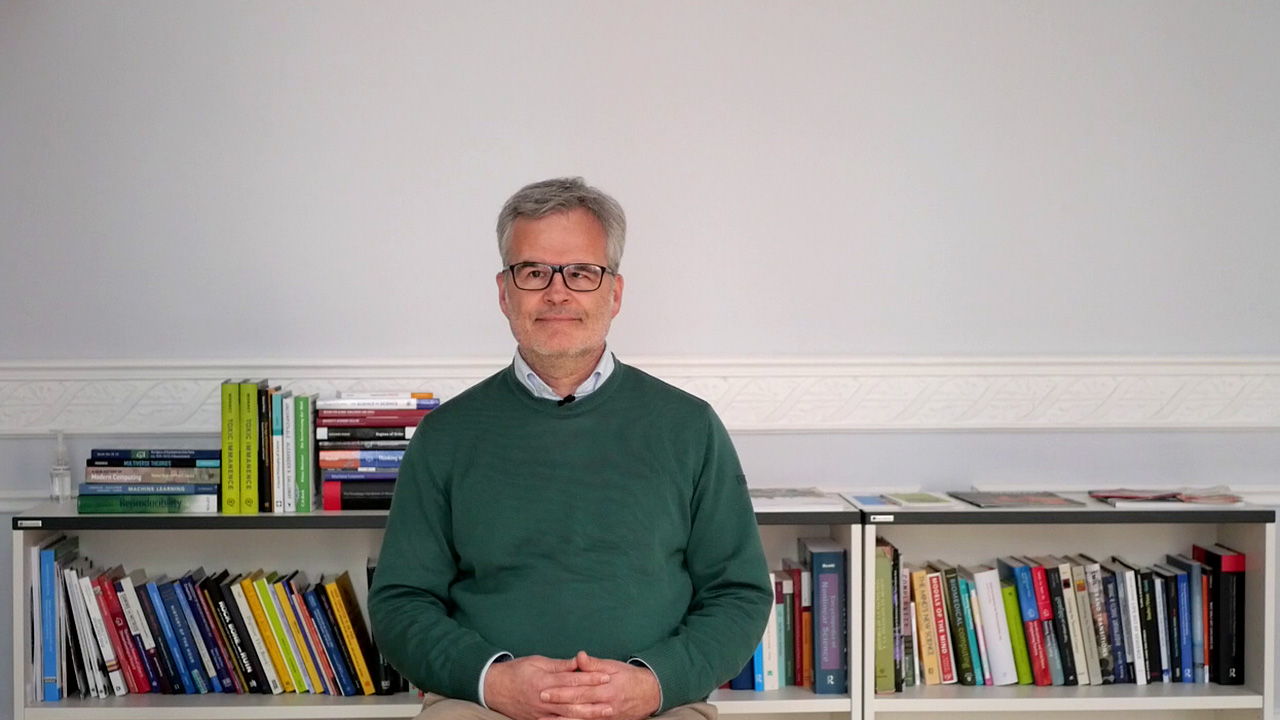
Get to know our current fellows and gain an impression of their research.
In a new series of short videos, we asked them to introduce themselves, talk about their work at c:o/re, the impact of their research on society and give book recommendations.
You can now watch the second video of the neuroscientist Hans Ekkehard Plesser on our Youtube channel:
Call for Papers: Summer School on “The transformation challenge: Re-Thinking cultures of research”
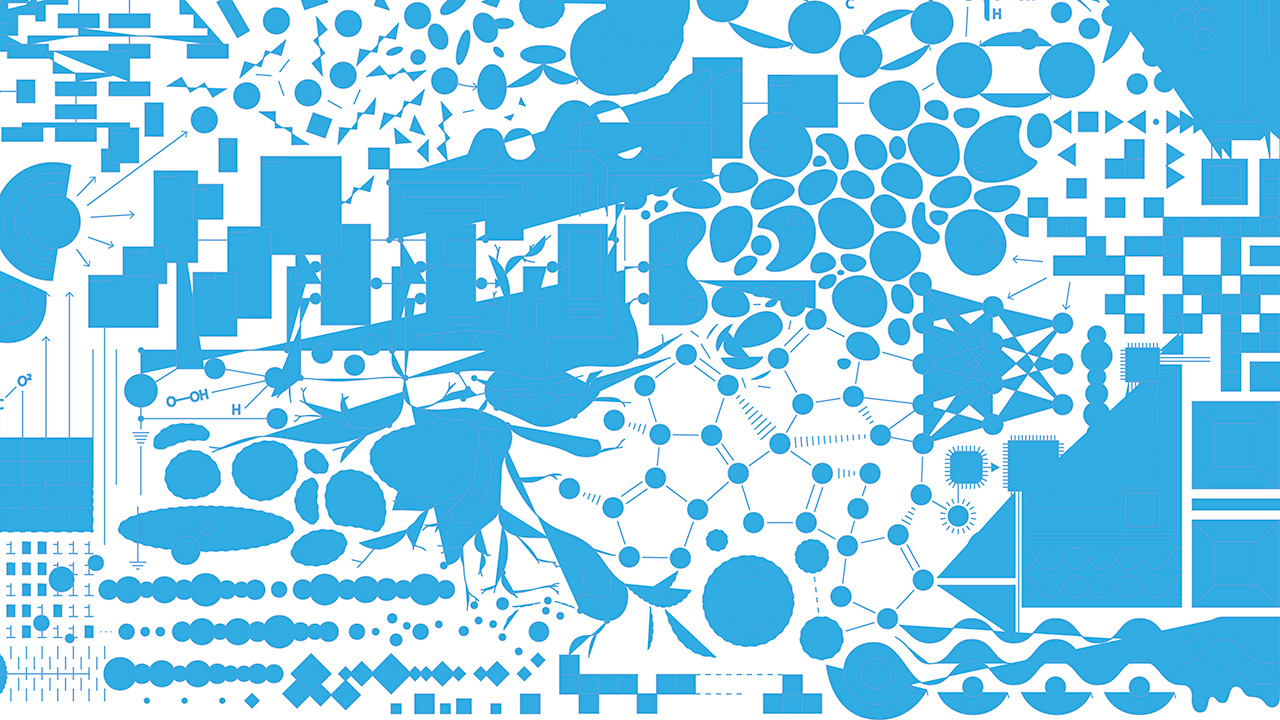
The Miguel Sánchez‐Mazas Chair (University of the Basque Country UPV/EHU), the Institute for Technology Assessment and Systems Analysis (ITAS, KIT Karlsruhe) and the The Käte Hamburger Kolleg: Cultures of Research at RWTH Aachen University will be hosting an International Summer School for PhD students, titled “The transformation challenge: Re-Thinking cultures of research” (Organizers: Stefan Böschen, RWTH/Käte Hamburger Kolleg Cultures of Research; Andoni Ibarra, UPV/EHU; Bettina‐Johanna Krings, ITAS/KIT; Andreas Lösch, ITAS/KIT; and Hannot Rodríguez, UPV/EHU).
The Summer School offers PhD students the opportunity to develop their projects in a stimulating working atmosphere and in an international context. We aim to provide an inspirational environment for learning and discussion that ensures excellent feedback on everyone’s work, in formats such as “Lecture”, “Individual Presentation”, “Workshop” and “Poster Presentation” (Keynote lecturers: Guido Caniglia, Helen Longino, Clark Miller and Harald Rohracher).
The Summer School is open to PhD students at any stage of the progress in their dissertation project. Please apply by January 15th 2024 at the latest by sending your proposals to
Bettina-Johanna.Krings@kit.edu.
For the requirements of your application and further information concerning the content and research questions of the Summer School, see the flyer.
Objects of Research: Andoni Ibarra
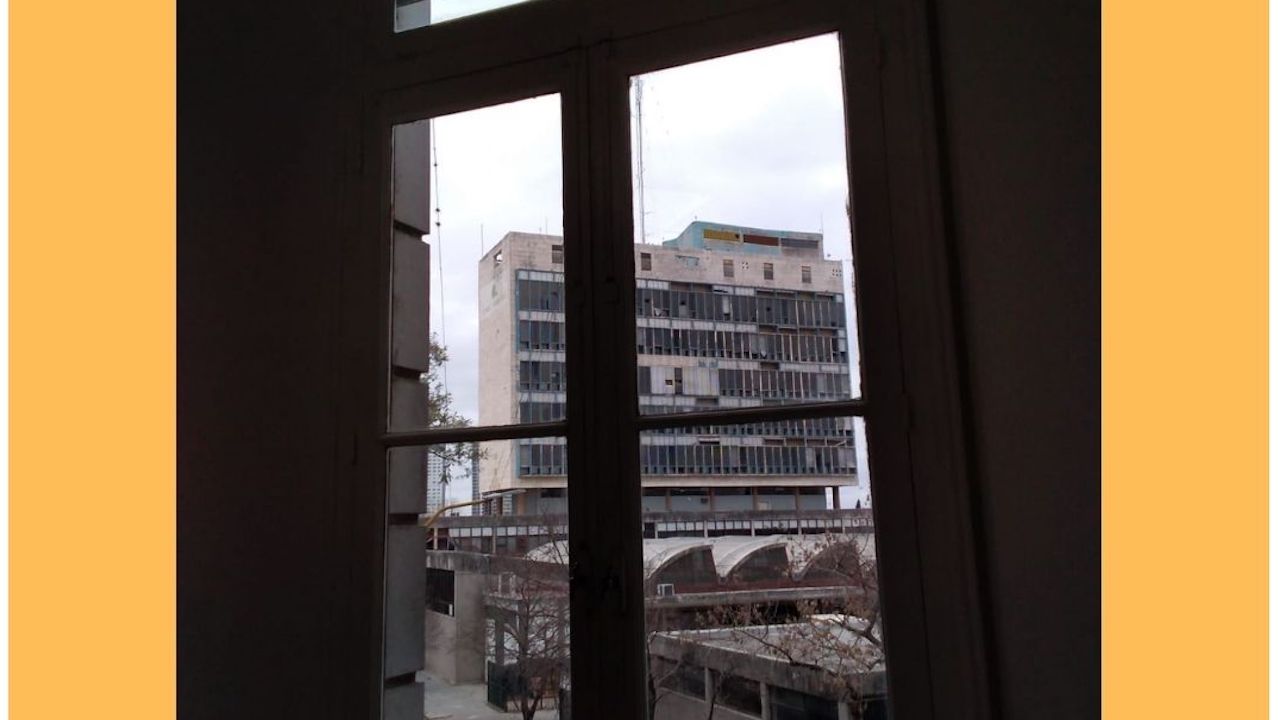

Today we proceed with our “Objects of Research” series and a picture by c:o/re alumni fellow Andoni Ibarra, whose research focuses on the performative character of scientific representations in the constitution of the world.
“Spending a few weeks in Argentina, in front of my desk, a Post Office building. A nice futuristic architectural concept, degraded by its construction materials, support of a communication antenna, appropriated by pigeons as a dovecote: a hybrid object.”

Objects of Research: Benjamin Peters
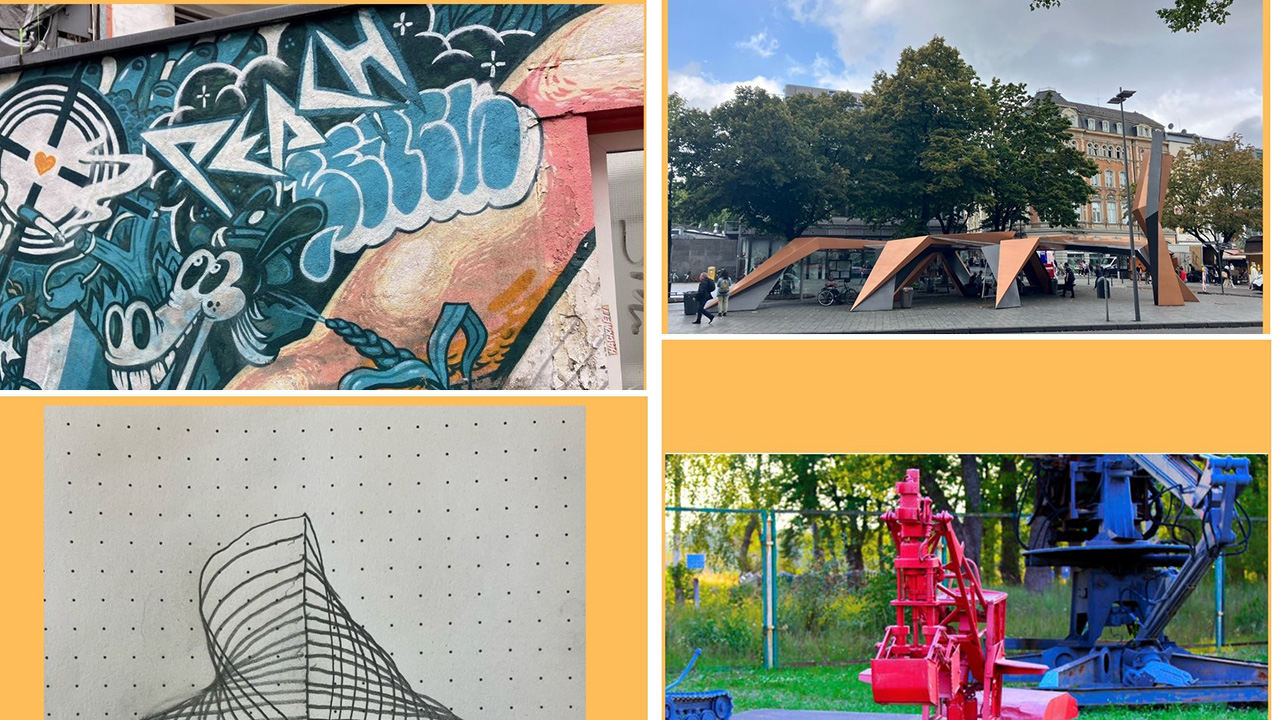

For the first post in our „Objects of Research“ series, we interviewed c:o/re alumni fellow Benjamin Peters, who works on artful intelligence, broadly taken across the long Soviet century.
“By saying that I study ‘artful intelligence’, which I mean only as a half joke, I take seriously the propositions to my career as a media scholar that…

1. As the first image suggests, human artfulness can be found all around, such as this snapshot of a wall on a side street not far from the Cultures of Research at the RWTH.

2. Sometimes architectural masterpieces that represent more than the sharp angles of twentieth-century modernism are all about us, such as this bus stop on the way to Cultures of Research in Aachen. Any study of science and technology has to ask, what does it mean? Sources do not speak for themselves.

3. Sometimes artificial intelligence is best found in letting people be people, such as a doodle here in a sketchbook. Straight lines do not always precipitate straightness.

4. I study how science, technology, and artificial intelligence has been understood in different times and places, such as this remote-controlled robot that failed in the immediate aftermath of the Chernobyl explosion in 1986 in Soviet Ukraine, which helps unstiffen, enliven, and sober our imagination of what may already be the case today and could be the case tomorrow.”
c:o/re Highlights of 2023: A look back
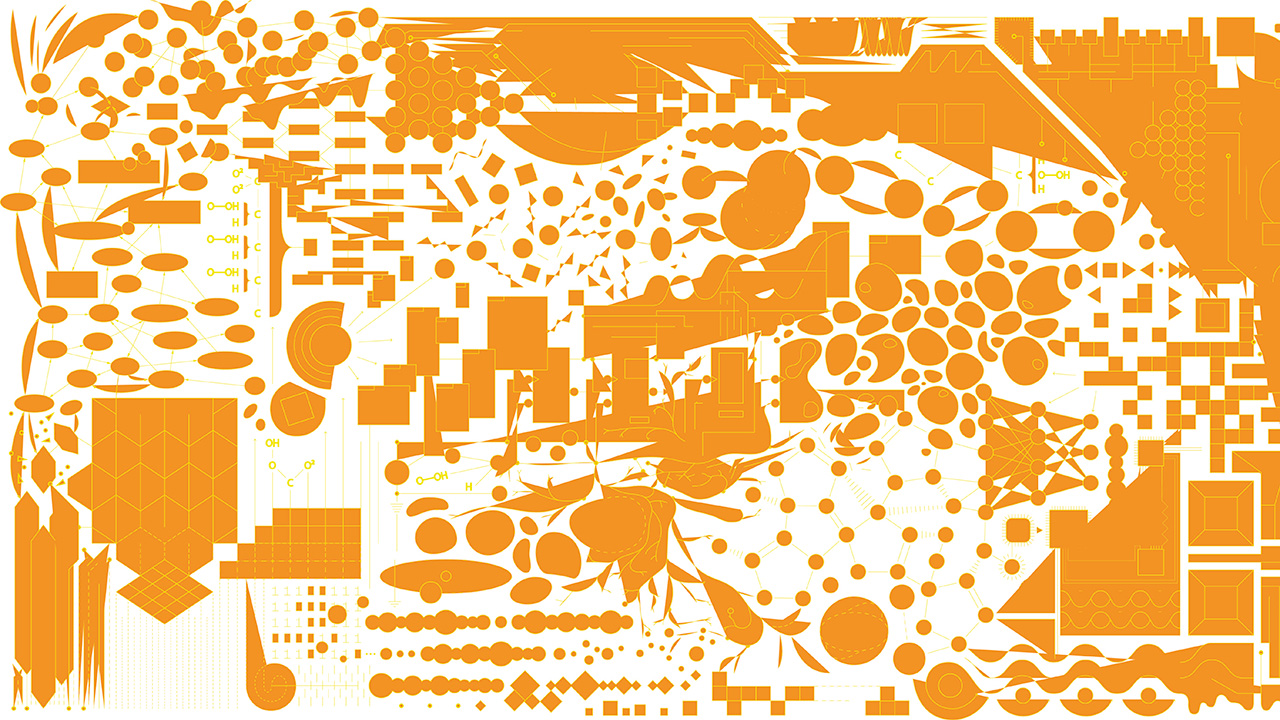
When we look back on the year 2023 at c:o/re, we can think of many great lectures, workshops and projects that we were able to realise in collaboration with our fellows and scientists from Aachen and around the world.
In this blog post, we take joy in remembering some of them:
Lecture Series
In the summer semester, the lecture series of c:o/re took place on the topic of “Complexity”. In seven lectures, the concept of complexity was examined from various disciplinary perspectives. You can reread some of the questions discussed in this and this blog post.
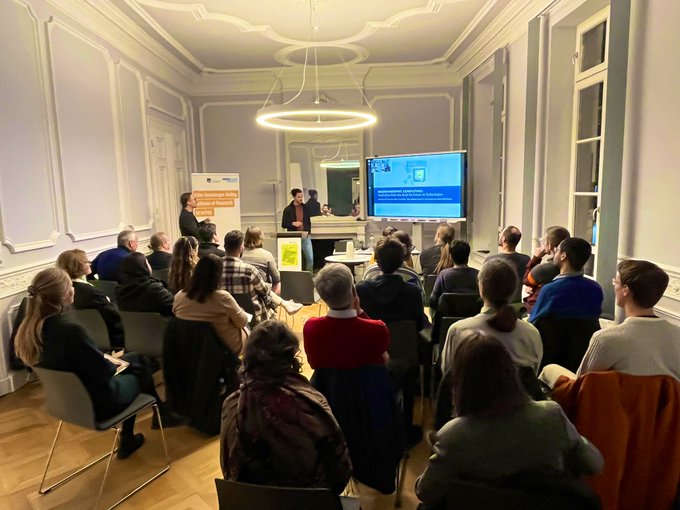
The lecture series for the winter semester 2023/24 began on 25 October 2023 with the topic “Lifelikeness”. Every two weeks until 7 February 2024, c:o/re fellows and guest speakers have discussed will continue to talk about the representations and imitations of life in its many forms. You can find all the dates in the program and impressions of some of the talks in the blog posts here and here.
Workshops
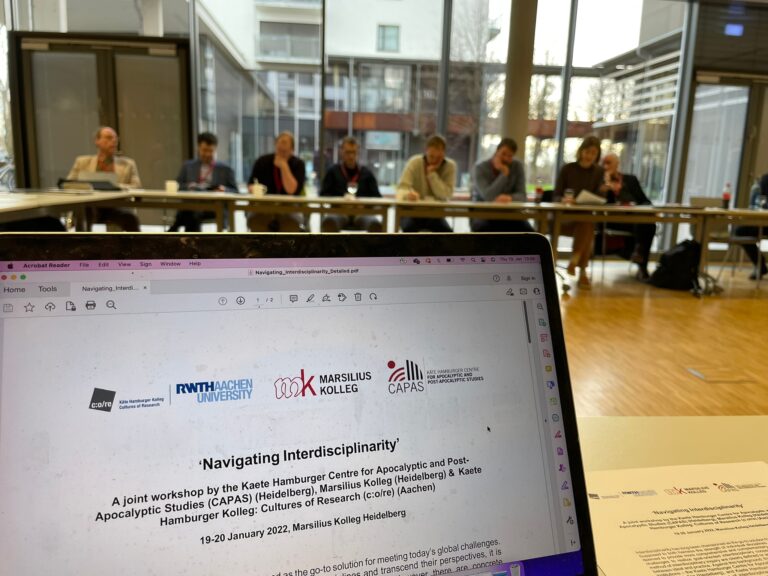
On 19 and 20 January 2023, the Marsilius Kolleg Heidelberg hosted the workshop “Navigating Interdisciplinarity”, which was organised in collaboration with CAPAS Heidelberg, the Marsilius Kolleg and c:o/re. The event brought together interdisciplinary research groups, mainly, but not only, from the humanities and social sciences to discuss the complex challenges of interdisciplinarity in the academic setting. The participants were able to discuss terms such as “complexity”, “security” or “collapse” as key aspects of interdisciplinary cooperation and research. You can read more about the workshop in this blog post.
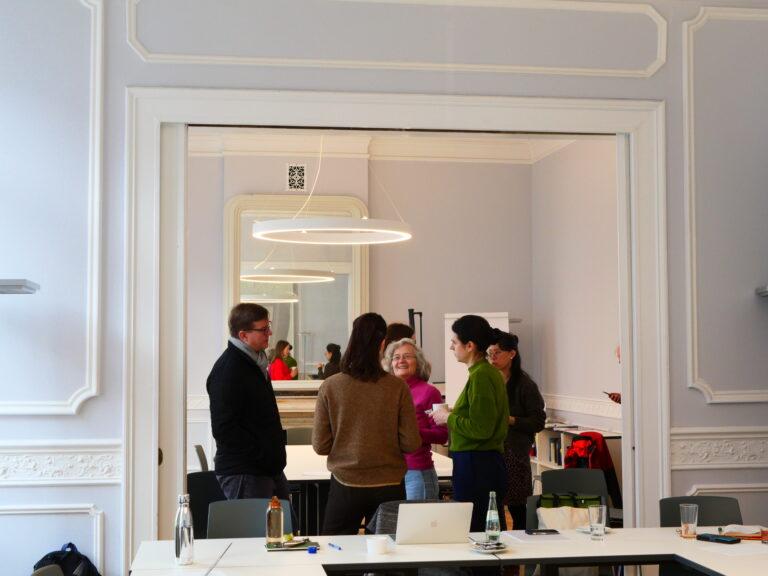
On 14 and 15 March 2023, the workshop “Turning points in reflections on science and technology: Toward historicising STS” took place at c:o/re. The aim of this event was to analyse the turning points in the intellectual history of Science and Technology Studies (STS) in the course of the 20th and 21st centuries. The meeting illustrated the interdisciplinary and multi-perspective study of STS that is being conducted at c:o/re. Director Gabriele Gramelsberger and the fellows Ben Peters, Clarissa Lee, Kyveli Mavrokordopoulou, Jan C. Schmidt and Arianna Borrelli organised the event. They were joined by several renowned early career researchers from the STS field, such as Lisa Onaga (Max Planck Institute for History of Science, Berlin), Carsten Reinhardt (Bielefeld University), Salome Rodeck (Max Planck Institute for History of Science, Berlin), Vanessa Bateman (Maastricht University) and Andreas Kaminski (Darmstadt Technical University). A recap of the workshop can be found here.
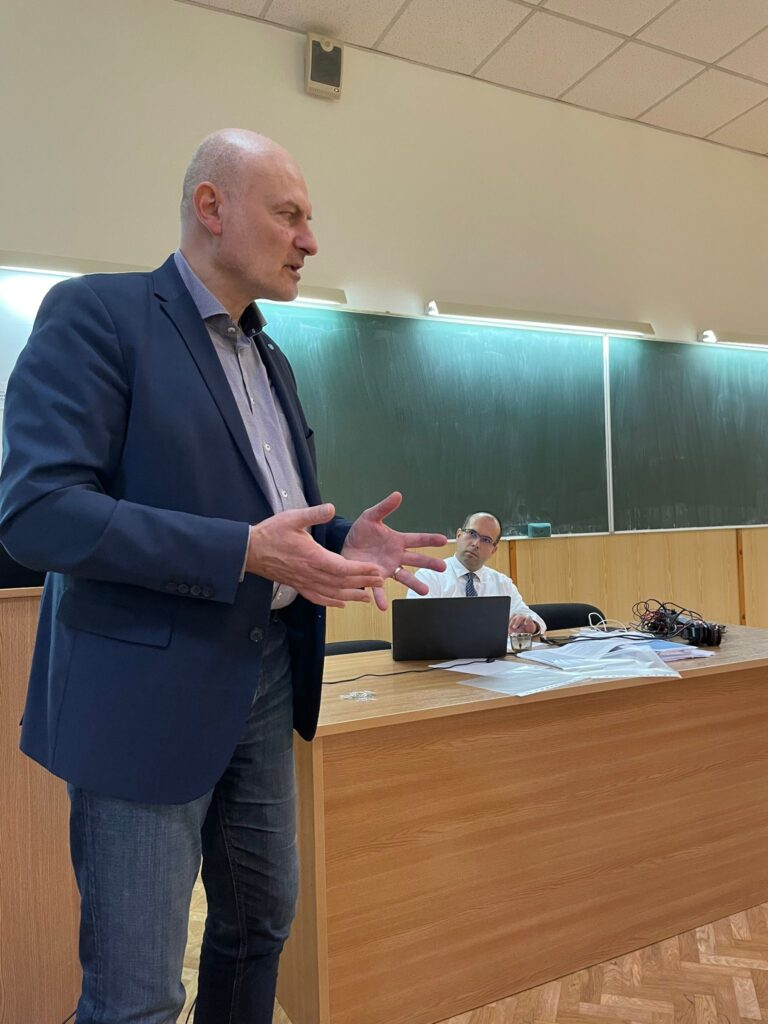
Following on from the success of the first workshop “Varieties of Science: Patterns of Knowledge” in December 2022 at the Universidad Nacional Autónoma de México (UNAM) in Mexico City, the networking trips to institutes of science and transformation research were continued as part of the Varieties of Science activities. From 5 to 6 May 2023, a group of fellows and staff as well as the directors travelled to the Institute of Philosophy at the University of Bucharest for the workshop “Varieties of Science 2. European Traditions of Philosophy of Science: Unexpected Varieties” to discuss the differences in research cultures with international colleagues. You can read more about the talks and discussions in this blog post.
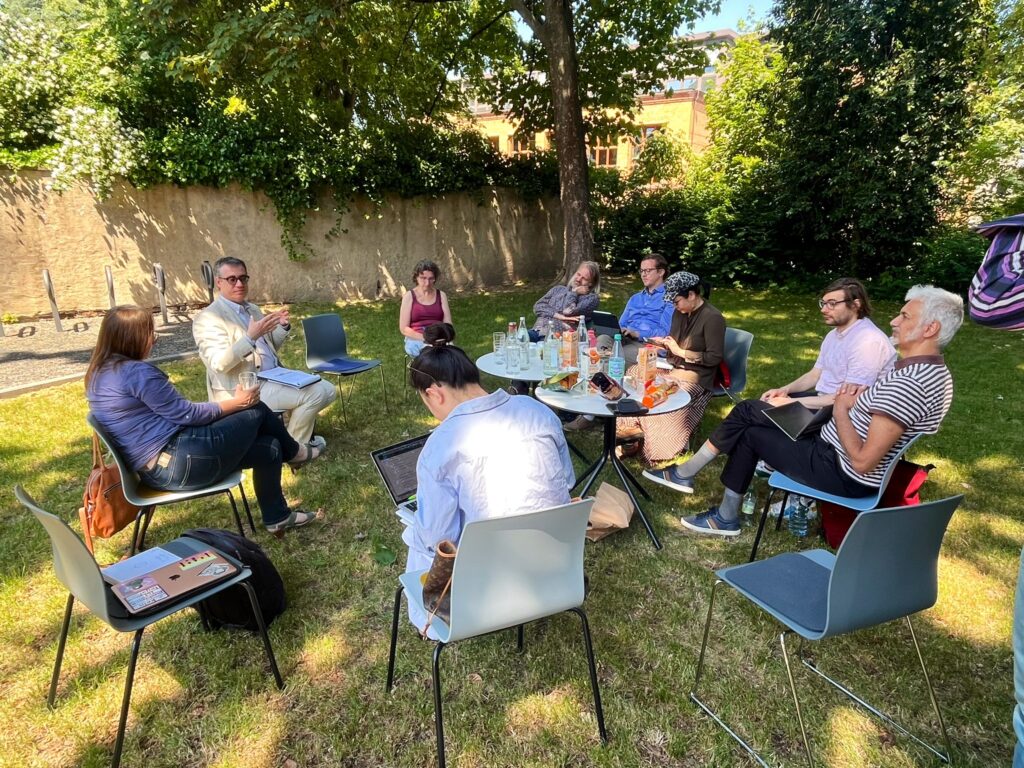
Another workshop took place from 13 to 14 June 2023 in collaboration with Dr. Thomas Haigh with the title “So What Was Artificial Intelligence, Anyway” at c:o/re. In the first part of the workshop, the history and philosophy of AI and digitalisation were discussed, with both the directors and the fellows being able to contribute their own research topics. In the second part of the workshop, Thomas Haigh presented the manuscript for his new book on the history of AI, which was followed by a discussion on the previously very heterogeneous concept of AI and the possibilities of standardising the various AI practices as a brand.
Conferences
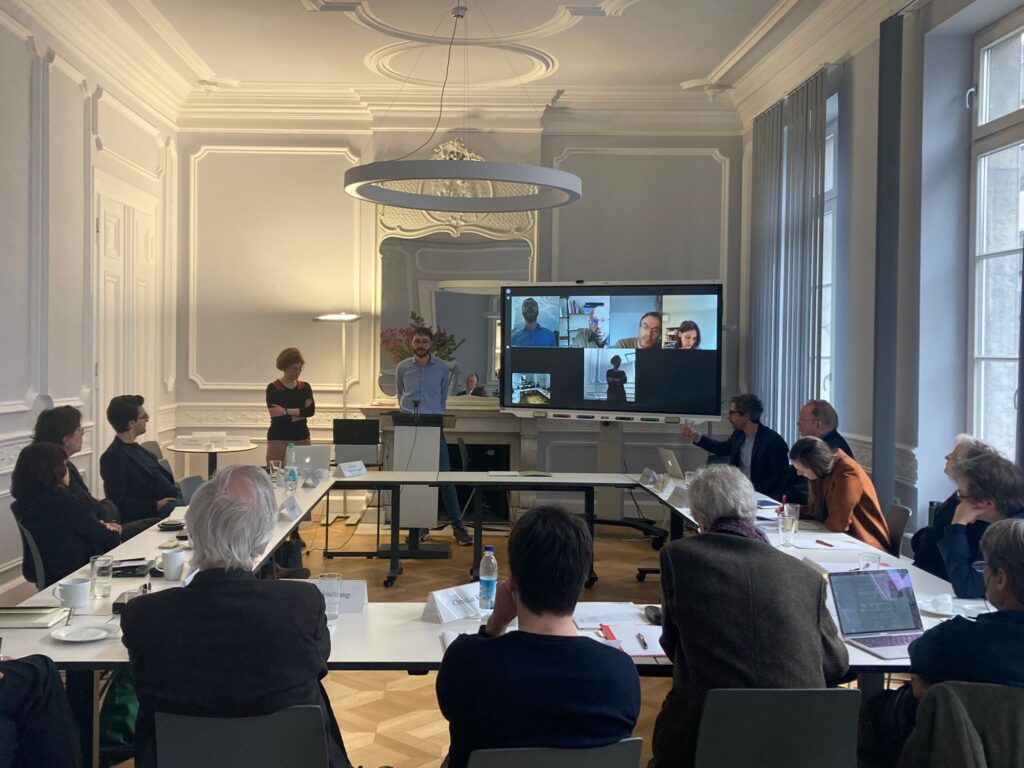
From 15 to 17 February 2023, c:o/re hosted the international conference “Wissenschaften des Konkreten”, organised by Caroline Torra-Mattenklott, Christiane Frey, Yashar Mohagheghi and Sergej Rickenbacher from the Institute for Germanic and General Literary Studies at RWTH Aachen. The concept of the conference was not only, as the title indicates, inspired by Claude Lévi-Strauss’ concept of the “Science of the Concrete”, but also follows his assumption that the sensual and experimental interaction with the things of the environment is equally the origin of the “wild spirit” as well as of modern science. A summary of the event can be found here.
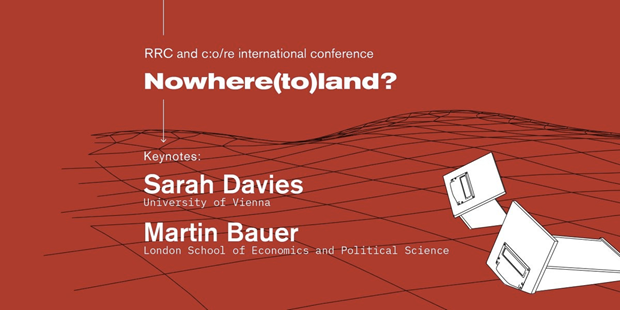
Together with the Rhine Ruhr Center for Science Communication (RRC), c:o/re directors Gabriele Gramelsberger and Stefan Böschen organised the conference “Nowhere(to)land? What science studies contributes to science communication” from 14 to 16 June 2023 in Bonn. Exciting questions and topics of science communication were discussed, including how the research fields of Science and Technology Studies (STS) and Science Communication Studies could be more closely linked in the future in order to fulfil the special communication requirements of science research results or how social participation in research could be implemented. The lectures and discussions also provided insightful impulses for the science communication at c:o/re.
STS Hub
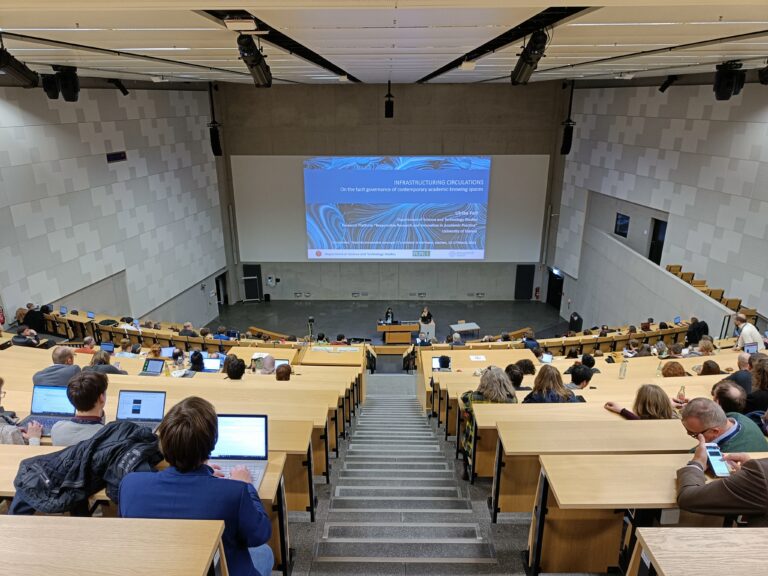
From 15 to 17 March 2023, a new format for the interdisciplinary linking of different science research communities was launched for the first time: STS-Hub.de. This format, conceived as a biennial conference with changing hosts, provides an opportunity for networking and exchange for STS researchers from German-speaking countries and a connection between different disciplines and areas of specialization. c:o/re played a leading role in the local organisation. In over 65 individual panels, the approximately 300 participants found space and room for discussion. The overarching conference theme of “Circulations” resonated and was addressed in various topics ranging from experimental democracy and science communication to ethics and art. In addition to traditional panels, there were also innovative formats such as walkshops and fishbowl discussions. The desired non-hierarchical exchange between researchers from different backgrounds was thus promoted and achieved. The conference was framed by two keynotes by Ulrike Felt, short-term fellow at c:o/re in March 2023, on the infrastructurisation of circulation in the field of science and Susann Wagenknecht on leaks in circular infrastructures and markets. You can read more about the conference on our blog here.
“Leonardo” Project
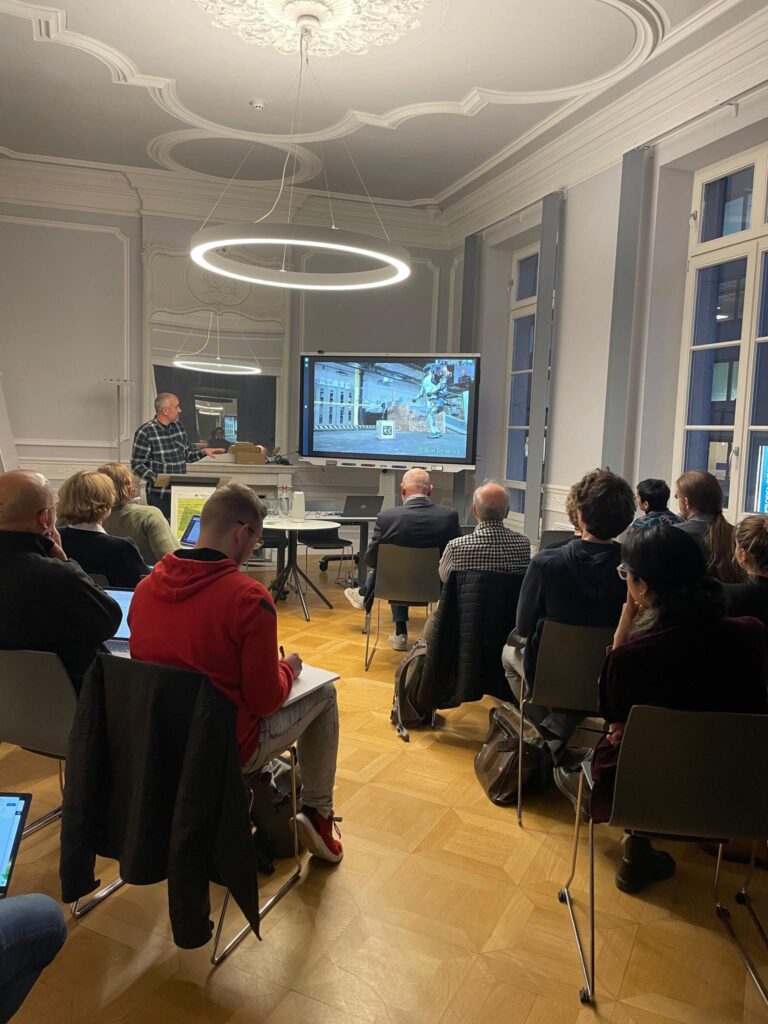
This winter semester, c:o/re’s participation in the interdisciplinary courses of the “Leonardo” project continues with the module “Engineering Life: Imaginaries of Lifelikeness” at RWTH Aachen University, which is organised jointly with the fellows. The module is aimed at interested M.A. students from all subject groups who can earn credit points for their degree programme. On this website, you can find more information about the “Leonardo” project.
Summer School

c:o/re was one of the main organisers of the International Semiotic Summer School in Prague “Visual Metaphors”, which took place from 23 to 28 July 2023 in cooperation with the Palacký University Olomouc and the Charles University. Through various lectures and presentations, the Summer School explored visual metaphors and the epistemological changes brought about by the current technological revolution. 80 students from various European universities took part. In this blog post, RWTH Aachen students wrote about their experiences during the Summer School.
Social Media
On X (formerly Twitter), c:o/re is still very active by announcing events, reporting live from conferences and talks and giving updates on everything that is happening at the centre.
We are still figuring out whether leaving X and using alternatives such as Bluesky is an option. Have you already moved your Social Media activities off X?
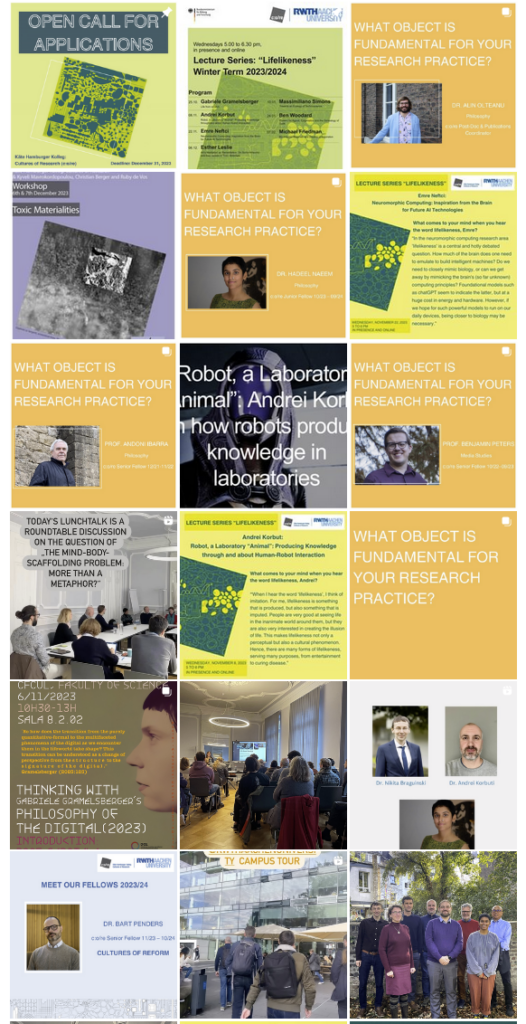
Since September 2023, c:o/re is also active on Instagram in order to give some insights into the work happening at the centre in a more tangible and less text-heavy way through photos and videos. We have also just registered with LinkedIn.
You are cordially invited to follow us on our social media accounts.
Video series: c:o/re shorts
We have started a new video series: c:o/re shorts. Get to know our current fellows and gain an impression of their research. In short videos, they introduce themselves, talk about their work at c:o/re, the impact of their research on society and give book recommendations. Take a look at the first two videos:
Blogposts
We would like to thank all the authors who contributed texts to our blog in 2023.
We invite you to read through them:
- What makes an ideal robot girlfriend?
- The notebook pt. 3: “For 20 years, I haven’t used a pen” – a computer nerd’s confession
- Research in Times of War – “Scientific Life Somehow Goes on…”
- Research in Times of War – “The War Added One More Factor – the War Itself”
- On Aryeh Ludwig Strauss: a German-Hebrew poet from Aachen
- Supercharge the real-world impact of Research, Innovation and Enterprise with brand building methodologies
What is coming in 2024?
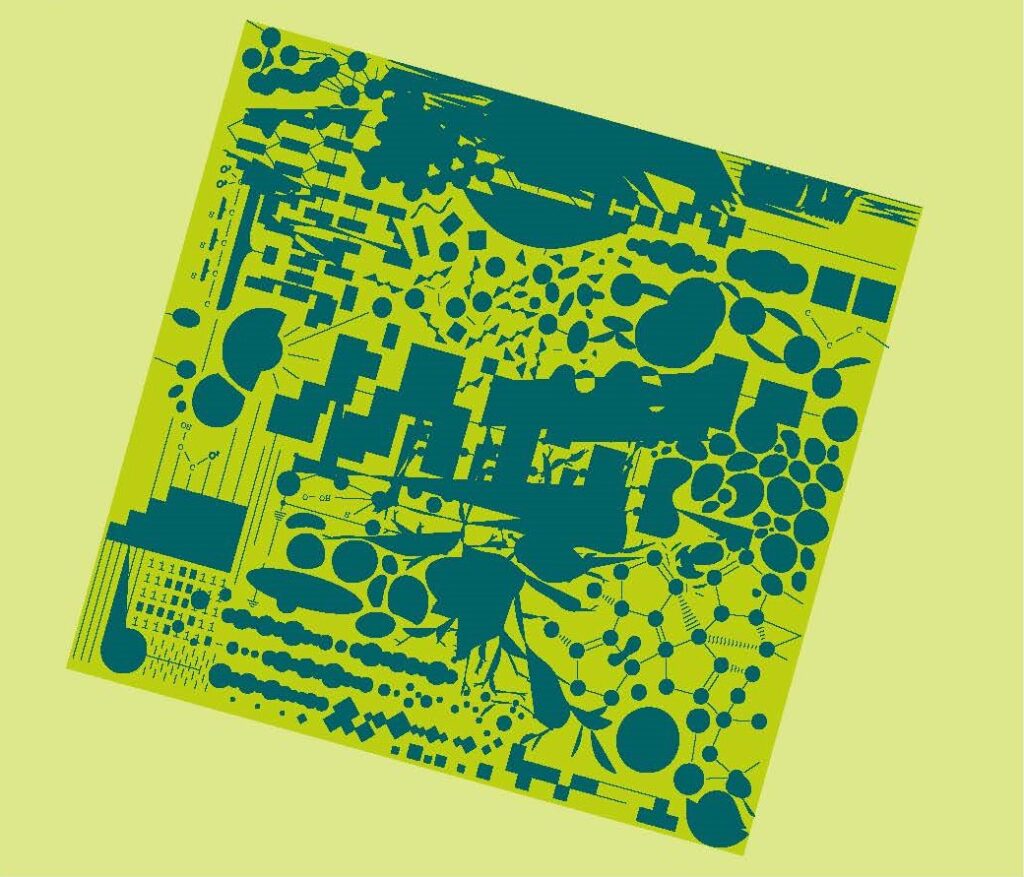
The Käte Hamburger Kolleg: Cultures of Research (c:o/re) is offering ten research fellowships for international scholars from the humanities, social sciences or STS as well as from natural, life and technical sciences for the academic year 2024/25. The fellowships can start between June and October 2024. The Call for Applications for 2024/25 is still open until December 31, 2023.
For the beginning of 2024, relationships with the arts will be strengthened with two upcoming collaborations.
In February 2024, a workshop on “Art, Science, the Public Sphere” in collaboration with the research project “Computer Signals. Art and Biology in the Age of Digital Experimentation II” from Zurich University of the Arts will be held at c:o/re. As part of this, the artist Valentina Vuksic will present an artistic performance on the sonification of data “Listening to Science”, which will be accessible to students and researchers at RWTH but also to citizens of Aachen.
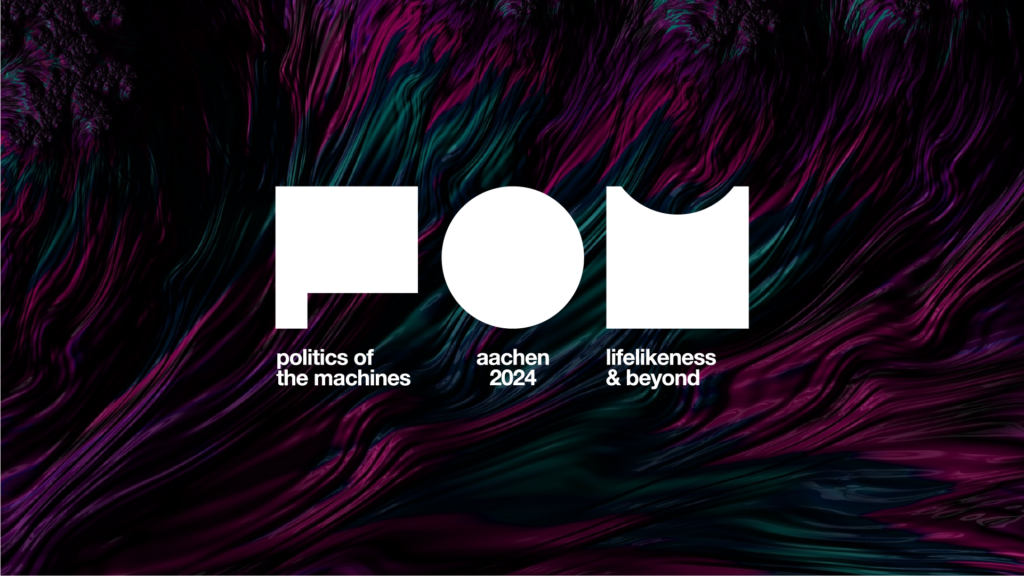
In April 2024, the experimental conference “Politics of the machines: Lifelikeness & beyond” will take place in Aachen, which seeks to bring together researchers and practitioners from a wide range of fields across the sciences, technology and the arts to develop imaginaries for possibilities that are still to be realized and new ideas of what the contingency of life is. You can find more information about POM on their website.
You can subscribe to our newsletter to stay updated with all projects and events happening at c:o/re in 2024.
We are looking forward to everything that awaits c:o/re in the coming year. Stay tuned!
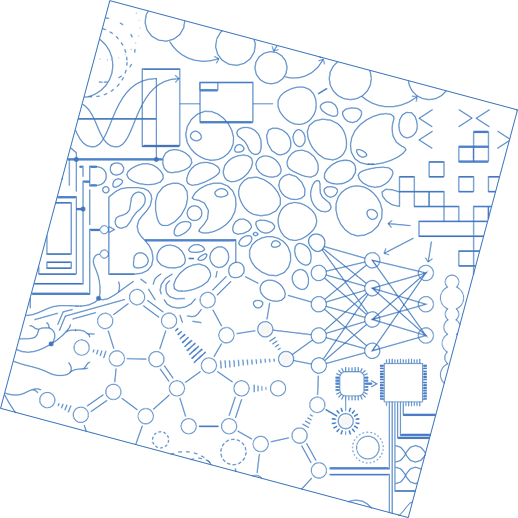
Walter Benjamin Fellowships for Anna Laktionova and Svitlana Shcherbak
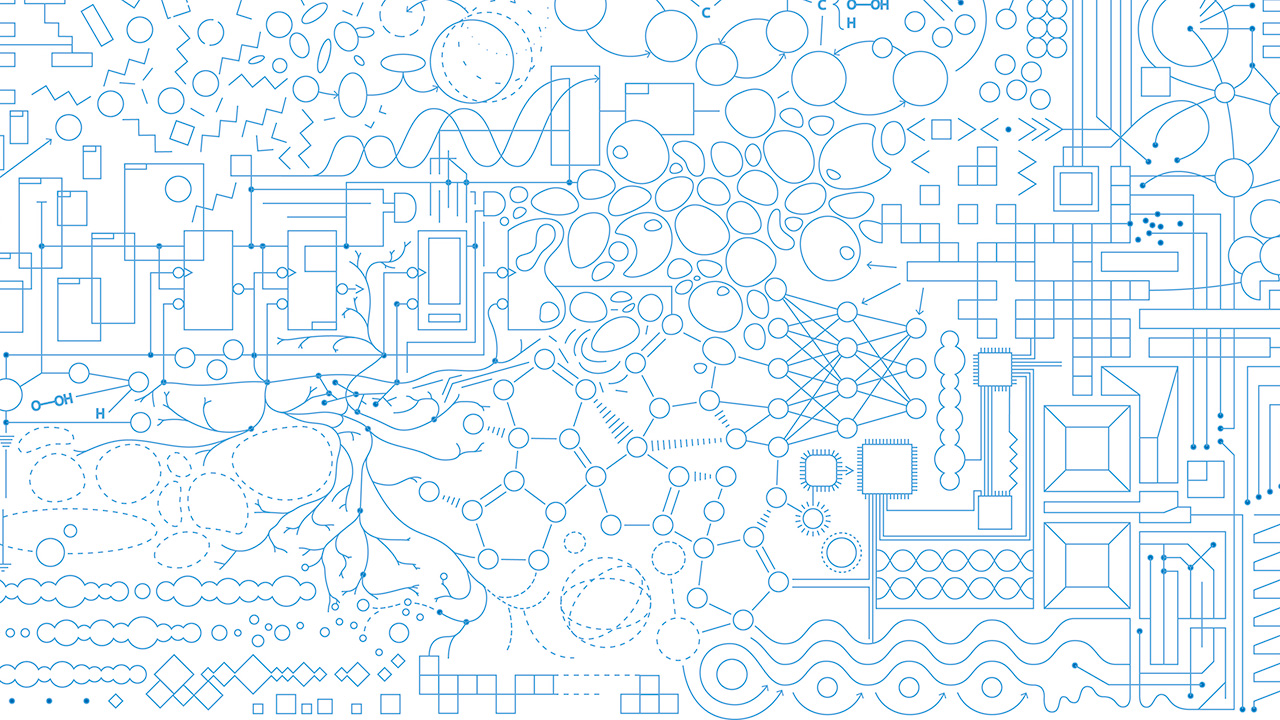
c:o/re fellows Anna Laktionova and Svitlana Shcherbak have both received a fellowship from the Walter Benjamin Programme, funded by the Deutsche Forschungsgemeinschaft (DFG), which enables them to continue working independently on their research projects at c:o/re even after the end of their c:o/re fellowship.
We would like to congratulate both of them and are delighted to be able to continue working together under one roof.
Here is what Anna Laktionova wants to do during the scholarship and what it means to her:
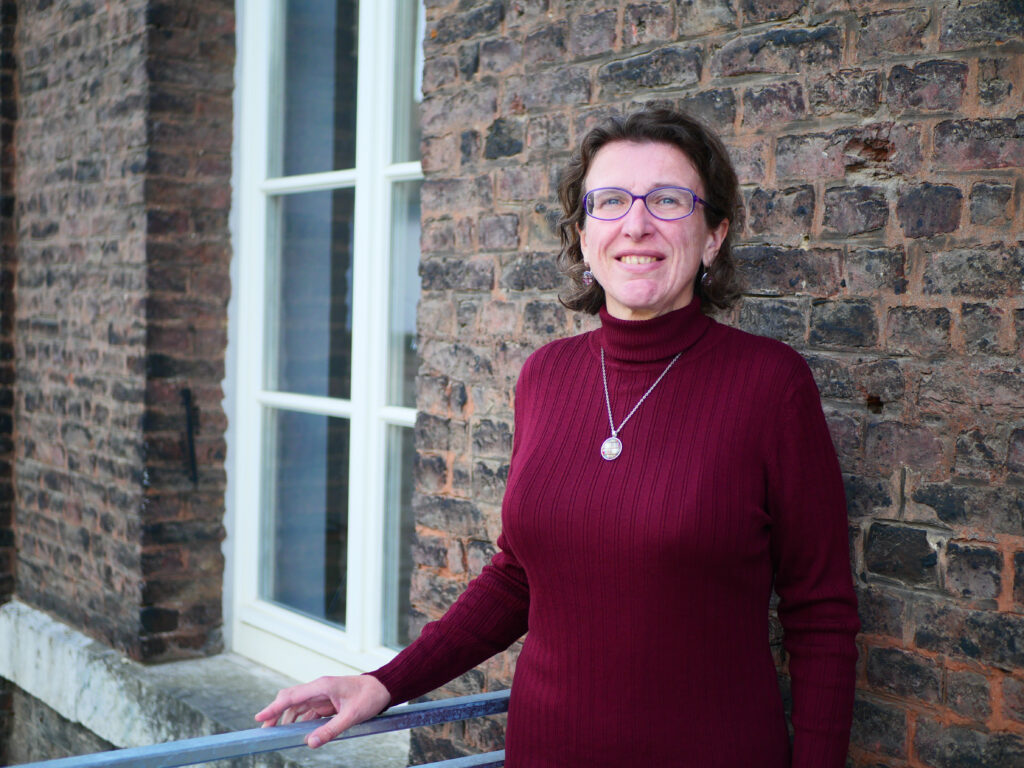
My project “Towards the agency based philosophy of (advanced) technology” is for me a very inspiring possibility to continue elaborating the maintained approach of Philosophy of Action and Agency within such nowadays fields as Philosophy of Technology, Philosophy of Engineering, STS etc. It involves theoretical and practical philosophical methodological platforms; allows me to continue professional grows and integrating into western Philosophical and Scientific circles including inter-, cross-, trans- disciplinary levels, for example, visit and participate in events of RWTH’s Institute of Industrial Engineering, Center for Construction Robotics, The RWTH Chair Individual and Technology, other labs. I plan to concentrate on such problematic plots as: agency-based philosophy of (advanced) technologies and ongoing technological transformations towards advanced technologies; varieties of types, levels, scales of machinic actions and human-robot interactions; machine learning methods and adaptive robots; problematic machinic actions and ethical regulations for trustworthy adaptive robotics; changing of the conceptual angle of view from technology descriptions to philosophy of action and agency; aligning man-machine interactivity.
From the personal side, the fellowship gives me possibility to continue to save my (now almost 3-years old daughter) from the awful war taking place in Ukraine. I enormously appreciate understanding, support, help from colleagues, staff and people in Aachen.
Svitlana Shcherbak will work on her research project entitled “Modernization Theory: Between Science and Politics. Case of Russia”:
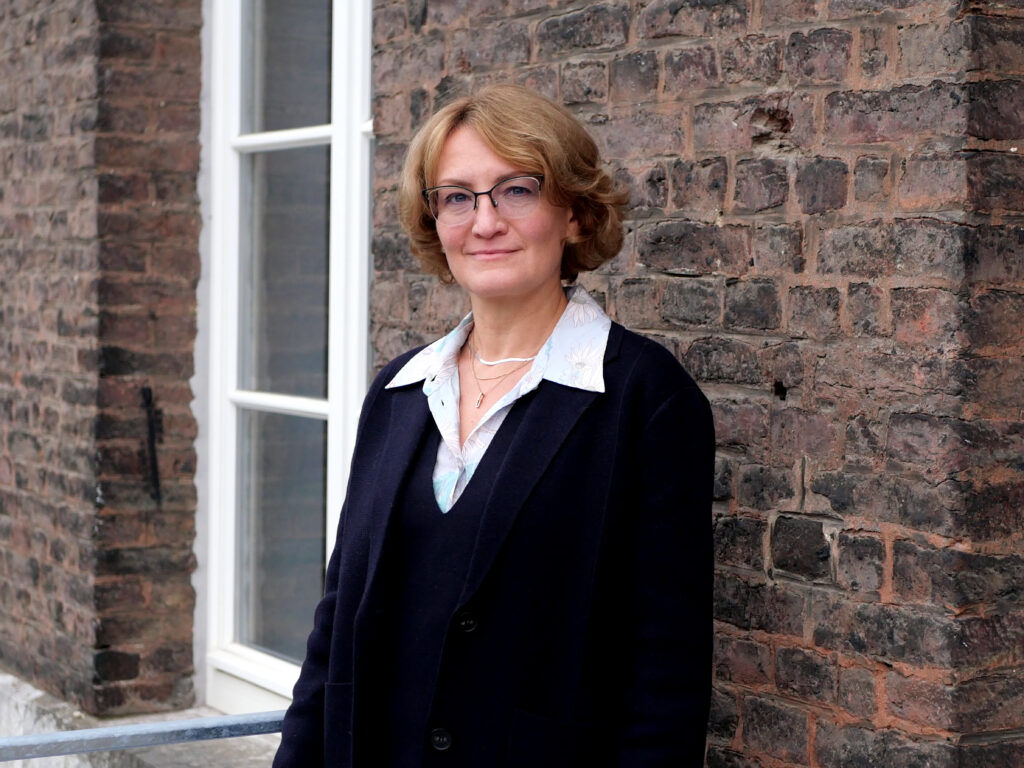
The Conception of the Foreign Policy of the Russian Federation, adopted in March 2023, for the first time defines Russia as a “civilization-state”. Russia is seen there as a conservative and technologically oriented sovereign state opposed to the “West”. Russia’s official ideology combines a conservative political agenda with the idea of technological modernization. It is a paradigm shift that has not come out of nowhere. This two-year research project investigates the academic (i.e., social science) and political discourse gradually introducing this shift in the post-Soviet space in relation to Western modernization theory. It examines the main shifts in the meaning of the “core concepts” of modernization theory, such as “democracy”, “development”, “freedom”, etc., in the Russian cultural and political context since 1990, compared to their original formulation in the Western social science, and how social theory has become an important ideological concept in Russian politics. To achieve this goal, the research is based on a qualitative discourse analysis. The theory of modernization was chosen because it is a grand theory that offers a broad vision of history and social development and is an important part of the social imagination. Modernization theory reflects not only the deep assumptions of the societies in which it emerges, but also those of the recipient societies. The case of Russia is particularly interesting, because the concept of modernization retains a central place in Russian political discourse, even though the basic assumptions of modernization theory contradict Russia’s self-description.
Objects of Research
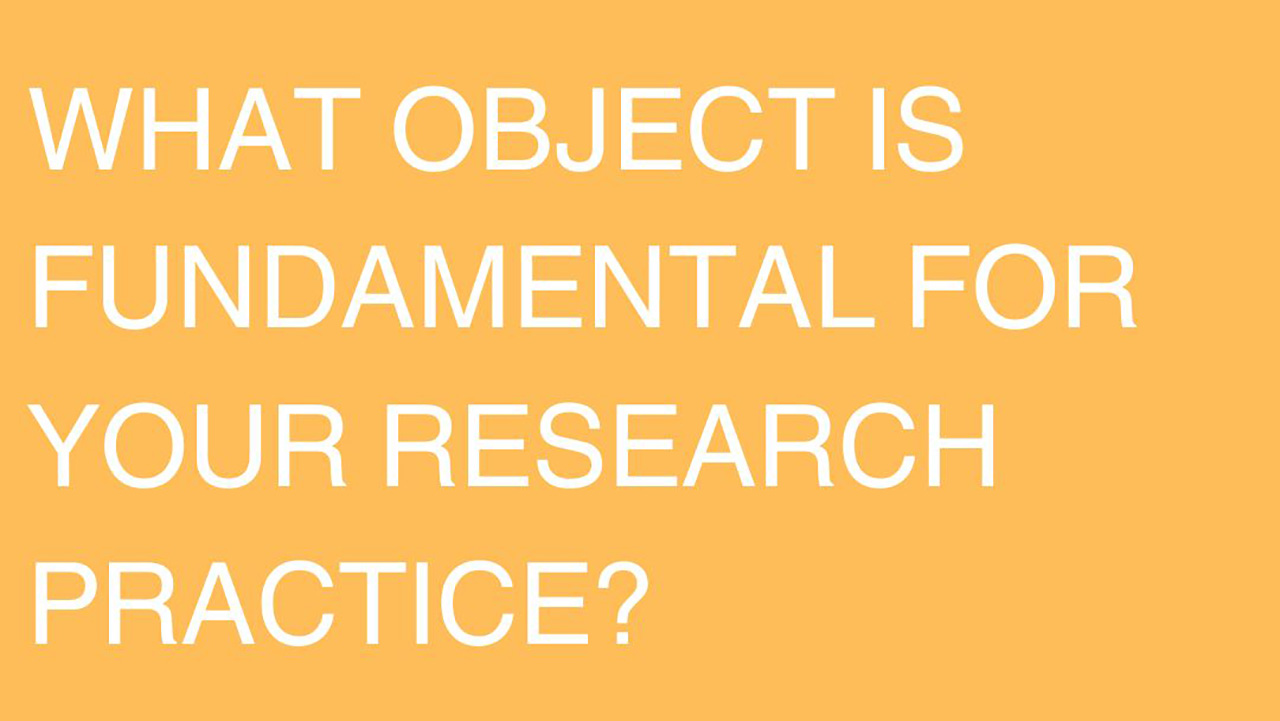
Being in the third year of our Fellowship Program, c:o/re is accumulating a remarkable variety of perspectives revolving around its main focus, research on research.
Questions tackled in this lively research environment are highly interesting and exciting and, as such, complex. The meeting of distinct research cultures may stir curiosity but may also leave one wondering what is the other even talking about… What are they studying?
To offer an insightful glimpse into the lively dialogues here, bridging and reflecting on diverse academic cultures, we are launching the blog series “Objects of Research”.
We asked current and alumni c:o/re fellows and academic team to show us an object that is most important for their research in order to understand how they think about their work.
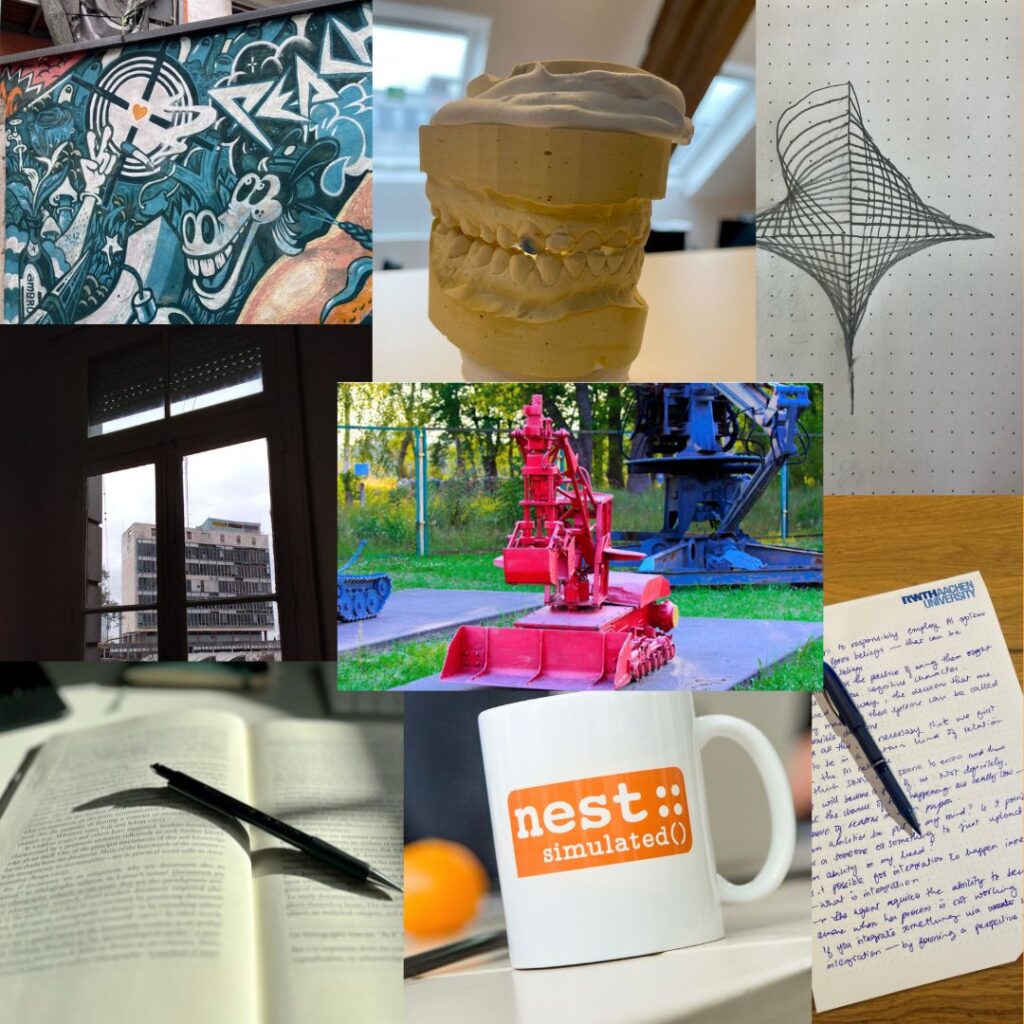
We anticipate that a first insight into a researcher’s academic culture stems already from seeing what does the word object mean for them.
We will publish the answers to their questions every Friday here and on Instagram.
We wish you exciting insights!
Here you will find all the answers that have already been published:

